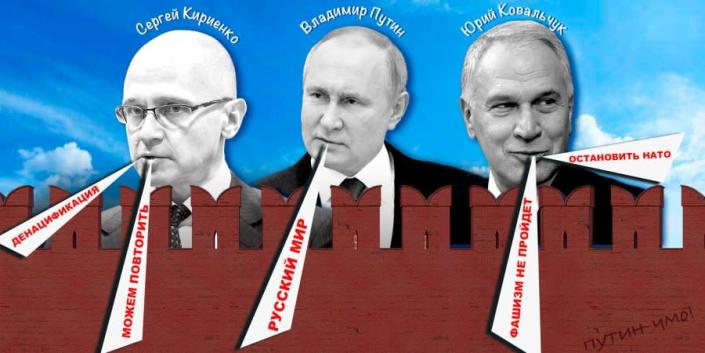
Read also: Russian spy network supplying intel about military movements in Donbas shut down by SBU
Ukraine’s SBU security service has finished investigating two Russian propaganda peddlers – writer and radio host Armen Gasparyan, and political operative Timofey Sergeytsev. Both were evangelizing the concept of “denazifying” Ukraine, calling for military action to eradicate the Ukrainian people. The investigation managed to gather enough evidence to proceed with a court filing, and Gasparyan and Sergeytsev are now wanted men.
“These individuals are can no longer travel to civilized countries,” SBU spokesperson Artem Dekhtyarenko told NV.
Read also: SBU unveils Russia’s plans for sham referendum in occupied Kherson Oblast
This case is important because it clearly shows that such “denazification ideologues” – as the SBU describes them – were preparing Russian public opinion for war well in advance of the ongoing full-scale invasion. People like Sergeytsev and Gasparyan have toiled for years, indicating that the Kremlin intends to go far beyond “liberating” Donbas, and has long been gearing up for war with Ukraine.
Gasparyan wrote a book called Denazifying Ukraine – a Country of Lessons Not Learned, all the way back in 2017. In it, he hammered home the necessity of “denzification.” According to the SBU, Gasparyan argued that armed invasion is a perfectly justified and reasonable way to achieve the goals of Russian political elite.
The book centers around the fundamental claim that the Ukrainian nation is incapable of existence outside of Russia; that Ukraine is not an independent, sovereign nation on the map of the world.
Read also: Russia has not abandoned its goal of crushing Ukrainian statehood
During his book tour, Gasparyan was asked what he thinks the future holds for Ukraine. In response, he quoted an unnamed Ukrainian official, who allegedly said that if Ukraine fails to reclaim Donbas in five years, the country will then also lose Zaporizhzhya, Dnipropetrovsk, Kharkiv, Mykolayiv, and Kherson oblasts.
“The whole thing (Ukraine) could implode any moment,” Gasparyan said during the presentation of his book in St. Petersburg.
The Kremlin grew very fond of this thesis: The SBU reported that Putin’s administration purchased Gasparyan’s book in bulk.
Sergeytsev, on the other hand, had some experience working as a political consultant in Ukrainian elections, and was largely unknown until the war. He wrote and article titled What Russia is to do with Ukraine, in April 2022. His arguments were similar to those of Gasparyan – Ukraine can no longer exist as a state, Ukrainians are second-rate people and should be eradicated as a nation.
Both men are parts of Moscow’s grand propaganda machine, and their work exemplified Kremlin’s policies. According to Dekhtyarenko, they worked to brainwash Russians and convince them that the Russian army has a mission to “save” Ukraine.
Read also: Ukraine criticizes IAEA for ‘rebroadcasting Russian propaganda’ amid seizure of Zaporizhzhya NPP
Experts agree that a great deal of effort went into preparing the Russian society for war by developing, justifying and disseminating anti-Ukraine narratives.
Chaos country, Bandera country
Oleksandr Morozov, a research fellow at Prague’s Charles University, argues we have to look as far back as 2004 to properly analyze the Kremlin’s ideology. That was a time when Putin was getting ready for his second term in office.
During his first presidential term, Putin was still regarded as a faceless, weak person; as a dark horse, appointed by “the family” (colloquial term, referring to the first Russian President Boris Yeltsin and his entourage). By then, Putin’s deputy chief-of-staff Vladislav Surkov was already rising to prominence.
Read also: Hybrid war from Lenin to Putin
“That’s when they started to chart the whole thing – establishing propaganda TV channels like Russia Today, founding the Nashy youth movement, and publishing books about Ukraine,” Morozov said.
At that time, the Ukrainian question boiled down to several major themes. First of those suggested that Ukraine is divided between eastern and western parts – a narrative present not only in Russian discourse, but also in Ukraine’s momentous 2004 presidential elections. Moscow’s second thesis painted Ukraine as a country of perpetual chaos and instability, a country of mob rule. The final pillar of this Russian narrative conjured up the myth of “banderivtsi,” which encapsulated everything related to Ukrainian national identity.
At the same time, the Kremlin was bringing back Soviet nostalgia, suggesting how great it would be to see the Soviet Union restored. Russian MP Konstantin Zatulin was the figurehead for this “movement,” and from 2008 to 2011 he chaired Russia’s parliamentary committee on CIS (Commonwealth of Independent States – an international organization, formed by most post-Soviet republics in 1991) relations. Zatulin later became a staunch supporter of the annexation of Crimea, with Putin presenting him with an award for his contribution for foreign relations, in July 2014.
Morozov also notes that in 2007, Putin made his infamous Munich Security Conference speech, which made clear that Russia is on a collision course with the West.
From that point onwards, Russia had a priority of preventing Kyiv’s European integration, as Moscow saw Ukraine drift in that direction.
“They weren’t saying that Ukraine’s European integration is a direct threat to Russia – yet,” Morozov adds.
“Instead, their attempts were focused on arguing that European integration is contrary to Ukraine’s interests.”
A watershed moment for Kremlin’s Ukraine policy came in 2014: Russian propaganda was amplified, became belligerent and militaristic, and started to cast doubt on the feasibility of the Ukrainian statehood.
After annexing Crimea and occupying parts of Donbas, Russian propaganda reached its peak and incorporated new narratives. Every state-run news agency, major newspapers, and news media were all deployed to amplify Russian propaganda. Ever since then, major themes centered around the Donbas, 2014 protests being a coup-d’état, and Ukraine being a puppet state that oppresses Russians and their language.
Read also: From the archives: The Azov Regiment has been called Neo-Nazi. Is it?
That’s when we first started hearing that Ukraine is run by neo-Nazis, “ukro-fascists,” and the rest of their incendiary vocabulary, which is still very much in use during this stage of the war.
Russian media became rather creative in finding new ways to “hate Ukraine” – even without explicit instructions from the government.
When Volodymyr Zelenskyy became Ukraine’s president in 2019, the torrent of belligerent propaganda somewhat abated, as Kyiv-Moscow talks were revitalized and even managed to secure a large-scale POW exchange. But by the end of 2020, Putin realized that Zelesnkyy wouldn’t make concessions. Thereafter, the Kremlin saw Zelenskyy’s conduct as “pro-Ukraine.”
“Anything pro-Ukraine or even the Ukrainian identity in general is tantamount to Nazification – from Kremlin’s point of view; that’s how we got to this denazification of theirs,” Morozov explains.
A word to kill
Gasparyan and Sergeytsev are essentially salaried propagandists, and not quite the designers of Moscow’s Ukraine narratives, according to Ivan Preobrazhenskyi, a political scientist. They do the bidding of whomever pays them, and they’ve been in the employ of Putin’s administration – directly or otherwise.
In Preobrazhenskyi’s view, a proper ideologue would have direct access to Putin – someone like Yuri Kovalchuk, who owns Rossiya Bank and was part of Putin’s inner circle since early days. The United States sanctioned Kovalchuk in 2014. According to Preobrazhenskyi, besides being Putin’s “wallet,” Kovalchuk exerts influence over the dictator’s thinking, setting up meetings with Christian Orthodox sages and soothsayers.
Read also: Putin in revenge mode, while his generals make money. What’s next for Russia’s ‘special operation?’
Kovalchuk’s son, Boris, paid many a visit to Putin’s “COVID bunker” residence during the pandemic, former Russian MP Ilya Ponomaryov told NV. Ponomoryov became a Ukrainian citizen in 2019.
Through Boris, the Kovalchuk family became close with Putin, as Ponomaryov described Boris Kovalchuk as Putin’s “drinking buddy.”
Even before Surkov lost his Kremlin post and the influence that goes with it, Sergey Kirienko was being responsible for the Ukraine angle of Russian propaganda. Now a deputy chief-of-staff, Kirienko reportedly oversees occupied Ukrainian territories.
Together with his colleague Aleksey Gromov, Kirienko shapes Russia’s wartime anti-Ukraine narratives.
Read also: No sense in thinking Putin will soon die, says former Ukrainian president Kuchma
Both Sergeytsev and Kirienko hail from an old, Soviet-era “methodologist” school of political science.
Head of RT Margarita Simonyan, along with top news anchors Dmitriy Kiselyov and Vladimir Solovyov, preside over a huge cadre of Russian pundits, broadcasting the Kremlin’s propaganda.
The SBU also told NV that Gasparyan’s book was prominently discussed on Solovyov’s personal YouTube channel – Solovyov Live.
Some of these merchants of odium go beyond their regular TV work. Preobrazhenskyi notes that Simonyan visited occupied Donetsk in January 2021, where she urged “mother Russia” to “take Donbas home.”
Read also: Soviet identity is gone forever, but Putin doesn’t get it
“Obviously, this speech of hers was planned by the Kremlin, and could hardly have been just her personal opinion,” Preobrazhenskyi explains.
“They failed to make Russians believe in the Novorossiya project, but they succeeded with Donbas. Where is Donbas? What does it include? Nobody knows. But people believe that it exists, and that it wants to join Russia,” he adds, commenting on Moscow’s considerable effort to harp on about Donbas in the last eight years.
Russian writer and politician Zakhar Prilepin also mongers in anti-Ukraine rhetoric: in March, he said Ukraine should just be absorbed by Russia.
Prilepin personally participated in the Donbas conflict back in 2014. He was an advisor to then-head of Moscow’s Donetsk proxies, Aleksander Zakharchenko. He was awarded a presidential patriotic literature grant in 2019.
In summer 2021, Putin penned an article on “historic unity of Russians and Ukrainians.” By then, in retrospect, he was clearly already preparing to launch a full-scale invasion.
Morozov notes that it’s very important for the Kremlin to avoid referring to the war as such. That’s why Russia is putting so much work into pushing the whole “denazification” narrative, insisting that the Russian Army is fighting “nationalist battalions” – as opposed to Ukraine’s Armed Forces.
Recently, Russian military propaganda has been leaning into Soviet nostalgia. In occupied Mariupol, Russian “authorities” erected a monument to Anna – an old Ukrainian woman, who greeted Ukrainian troops with a red flag, mistaking them for Russians. After the video of the incident went viral, she became a star of posters and street art all across Russia.
Kirienko even referred to the woman when he was unveiling the monument.
“We now have another symbol (of the fight against fascism) – Anna the granny; she became a living symbol of the generational struggle against Nazism and fascism,” Kirienko said.
In an eventual media interview, Anna said her attitude towards Russia changed after her house was damaged by Russian shelling.
Read also: Top five Russian propaganda WWII myths debunked
This whole story of an old woman with a Soviet flag is a great illustration of how Russian propaganda falsifies history, Preobrazhenskyi explains. The process has been underway in Russia for years: history books were rewritten; blatantly fake historical books were published. All the while, political opposition in the country was wiped out – along with NGOs, religious organizations, and anti-war movements – and censorship was established and constantly tightened.
According to Preobrazhenskyi, the Russian Orthodox Church is very much a part of Russia’s ideological apparatus.
In conclusion, experts seem to agree that Gasparyan and Sergeytsev were merely minor parts of the grand design of “denazifying” Ukraine. Nevertheless, them becoming internationally wanted persons is an important step towards eventual accountability for those who spent many years calling for the Ukrainian nation to be extinguished.
Read the original article on The New Voice of Ukraine




